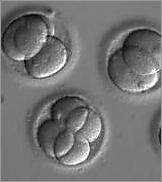
The New York Times and other news outlets are reporting a major milestone in genetic engineering: the successful editing of genes in human embryos to repair a "common and serious disease-causing mutation." A new study published in Nature describes the research performed by a team led by biologist Shoukhrat Mitalipov of Oregon Health & Science University. Since the discovery of the CRISPR gene-editing method, scientists and ethicists have been discussing the opportunities and challenges presented by the procedure. Robin Lovell-Badge, a professor of genetics at the The Francis Crick Institute in London noted “You could certainly help families who have been blighted by a horrible genetic disease.” On the other hand, Consortium collaborator Henry Greely of the Center for Law and the Biosciences at Stanford University notes ethical concerns related to "so-called germline engineering, which refers to changes made to embryo that are inheritable. 'If you’re in one camp, it’s a horror to be avoided, and if you’re in the other camp, it’s desirable,' Dr. Greely said. 'That’s going to continue to be the fight, whether it’s a feature or a bug.'" Read the entire article here.